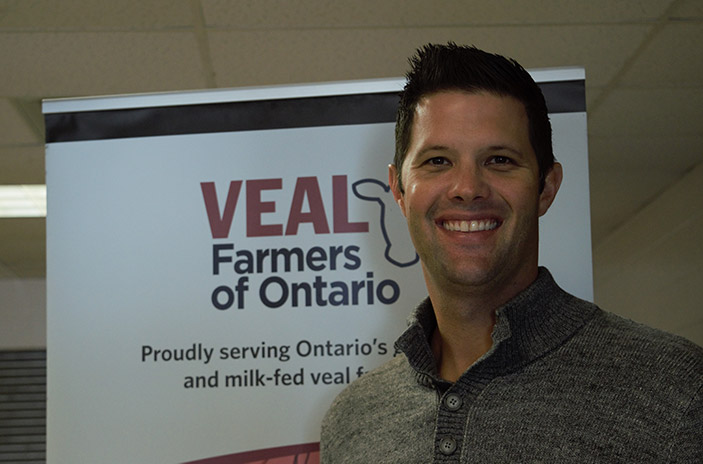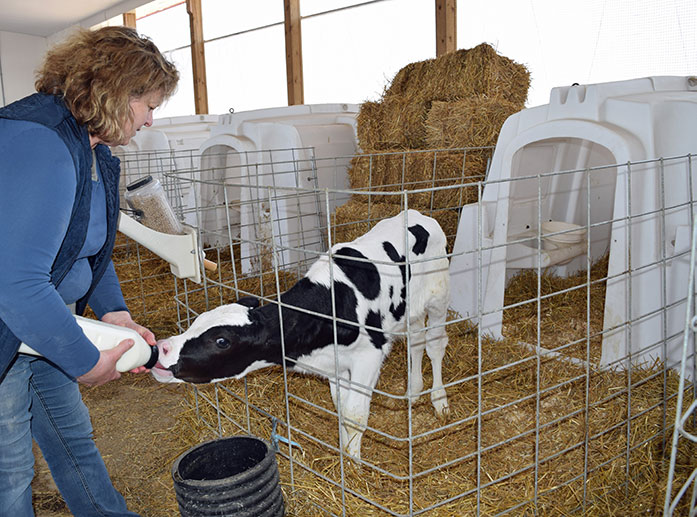Healthy Calf Conference
Follow to stay up-to-date on all Healthy Calf Conference updates. Speaker announcements, sponsorship information, registration announcements, and more.

Calves are far less likely to get sick after the first few weeks of life. This leads us to the question, “What changes in the calf during this period?” Dr. Michael Ballou from Texas Tech University aimed to answer that question for a record number of attendees at the 2018 Healthy Calf Conference.
The calf’s gastrointestinal (GI) tract undergoes rapid change as they move from a monogastric (single-stomach) to a ruminant in the first weeks of life. Most calf managers know that a calf is born with small gaps in the gut wall that let antibodies from colostrum enter the calf’s system. However, these gaps can also let in pathogens (disease-causing organisms).
Colostrum is more than just antibodies – it also helps the GI tract mature. “Colostrum protects the GI tract while it develops,” explained Ballou. Feeding clean, high quality colostrum helps the calf build an immune system, delivers antibodies to the gut to protect it from pathogens, and helps close the gaps in the GI tract, preventing pathogen absorption.
Feeding colostrum in an unclean bottle sets the calf up for failure by delivering pathogens right into the gut, where they easily pass through the gaps and enter the calf’s system.

GI closure starts at the upper tract (closer to the mouth) and proceeds down through the tract. While colostrum antibodies aren’t absorbed after 24 hours, it is seven to 10 days before the GI tract fully closes to pathogens.
Starter intake further stimulates the development of the GI tract. “If you delay feeding starter, you’re going to delay everything,” Ballou warned. Ensuring bowls are shallow, bright (white or a light colour), at nose level, and contain a small amount of starter that is refreshed daily are the most effective strategies to increase starter intake in young calves.
A 2009 study by Berge et al. found that feeding a colostrum supplement (10 grams of immunoglobulin G (IgG)) for 14 days reduced scour days in calves by half. Feeding increased milk solids after the colostrum feeding period also protected calves post-weaning when exposed to new pathogens, Ballou revealed. He was discussing his study that found 27% of calves fed a lower quantity of milk solids died when exposed to respiratory disease after weaning, while no calves on the accelerated program died after exposure. This provides more evidence that early calf care can have a lasting impact.
Use the supplements you already have. A 2009 study by Berge et al. found that feeding a colostrum supplement (10 grams of immunoglobulin G (IgG)) for 14 days reduced scour days in calves by half.
While more research is needed to prove specific supplements are effective, no supplement will make up for poor management. Supplements “help animals that are challenged, not overwhelmed,” said Ballou. Always be sure that the supplement is safe to feed. Your veterinarian and nutritionist can help you with this. If you add a supplement, only make one change at a time, and be sure to track calf performance. Recording weights, average daily gain, sickness, and treatments will help you evaluate the effectiveness of the supplement for your herd and determine if the cost of the supplement translates into improved profitability.
Good nutrition and practices that promote immunity need to start at birth and continue for the entire pre-weaning period. Calves that have received the best care will be able to overcome common calfhood challenges and reach their full potential.
Be sure to follow Calf Care Corner on Facebook and Twitter (@CalfCareCorner) and sign up for monthly e-blasts at www.calfcare.ca.
Follow to stay up-to-date on all Healthy Calf Conference updates. Speaker announcements, sponsorship information, registration announcements, and more.
The Codes of Practice are nationally developed guidelines for the care and handling of farm animals. They serve as our national understanding of animal care requirements and recommended practices.